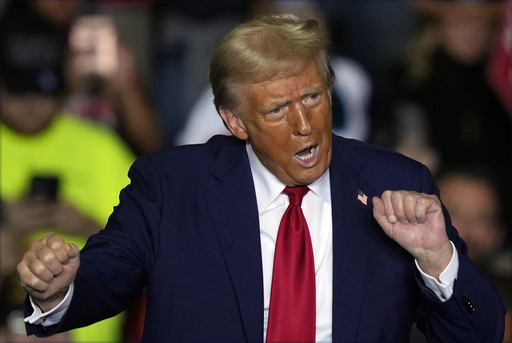
HARRISBURG, Pa. — Investigations into alleged fraudulent activities involving voter registration applications in three counties of Pennsylvania have sparked a surge of misinformation online, with former President Donald Trump weighing in on the matter. Authorities are scrutinizing the situation in Lancaster, Monroe, and York counties, but limited specifics have been publicly shared so far, as local prosecutors assess whether any illegal activities have occurred.
In Lancaster County, District Attorney Heather Adams, a Republican, highlighted that election officials raised concerns over two batches of voter registration applications, citing numerous indicators of similarity. The investigation is currently examining around 2,500 forms. Meanwhile, Lancaster officials have notified officials in two additional counties to review related registration applications. In Monroe County, the Board of Elections discovered approximately 30 irregular forms and forwarded these to the district attorney’s office for further investigation.
York County’s Chief Clerk Greg Monskie confirmed that a review of suspicious forms is underway in that county as well. County Commissioner Julie Wheeler mentioned in a statement that voter registration and mail-in ballot applications were part of a “large delivery containing thousands of election-related materials” received from a third-party group. She indicated that should any fraudulent activities be detected, the district attorney would pursue an investigation.
Currently, Lancaster County has not identified the source of the suspect forms. In a communication with the media, Wheeler suggested that the documents received in York County were submitted by Field+Media Corps, acting on behalf of the Everybody Votes Campaign. This organization is a national, nonpartisan group dedicated to enhancing voter registration efforts.
Field+Media Corps CEO Francisco Heredia stated that his organization, based in Mesa, Arizona, has not been contacted by Pennsylvania election officials regarding these issues and currently lacks information about the forms in question. He added that if they are approached, they would cooperate with local officials to resolve any discrepancies to assist eligible voters. He noted that several other organizations are involved in voter registration efforts in the region as well.
Republican presidential candidate Trump has commented on the investigations, stating on his Truth Social platform that Lancaster County was “caught with 2600 Fake Ballots and Forms, all written by the same person.” However, authorities have clarified that there is no evidence to suggest that ballots are implicated in the ongoing inquiry. The 2,500 voter registration forms flagged for investigation include both questionable and legitimate submissions, with the latter being processed as standard.
During a campaign rally in Allentown, Trump asserted that “they’ve already started cheating in Lancaster,” claiming that 2,600 votes were caught in misconduct. Nevertheless, television coverage of the matter made it clear that Lancaster officials are concentrating on voter registration applications rather than actual votes. Some forms were noted to contain false names, suspicious handwriting, or incorrect addresses, but authorities did not confirm that they were authored by a single individual.
Adams explained that forging a voter registration application is considered a third-degree felony, which carries punishments of up to seven years in prison and fines reaching $15,000. Furthermore, violations of state election laws can incur various penalties, including the loss of voting rights for a decade.
Concerns regarding voter registration fraud have been addressed by Kathy Boockvar, a former Secretary of State in Pennsylvania. She noted that past incidences of fraud were often associated with financial incentives for individuals involved in voter registration and inadequate oversight of such initiatives. Although fraudulent registration forms can complicate processes and frustrate election officials, Boockvar emphasized that these issues do not necessarily lead to an elevated risk of improper voting.
In Pennsylvania, election workers validate the identity and address of new voter registration submissions. They also send confirmation mail to the registrant’s listed address, and new voters must provide identification. Their signatures are checked against official poll books to further reinforce the integrity of the election process.
Al Schmidt, the state’s top election official in Pennsylvania, cautioned against the proliferation of misinformation ahead of the upcoming Election Day. He urged the public to rely on trusted sources for information, stating, “Spreading videos and other information that lack context, sharing social posts filled with half-truths or even outright lies is harmful to our representative democracy.” Schmidt assured audiences of the comprehensive measures in place to ensure that only eligible individuals are allowed to cast ballots and that each voter’s vote is counted accurately.
